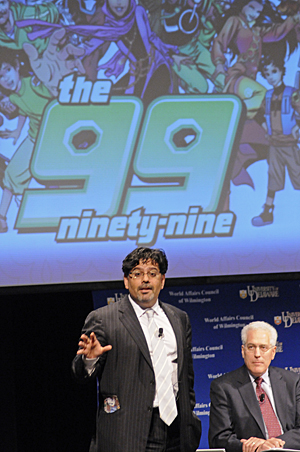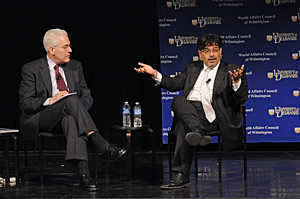
ADVERTISEMENT
- Rozovsky wins prestigious NSF Early Career Award
- UD students meet alumni, experience 'closing bell' at NYSE
- Newark Police seek assistance in identifying suspects in robbery
- Rivlin says bipartisan budget action, stronger budget rules key to reversing debt
- Stink bugs shouldn't pose problem until late summer
- Gao to honor Placido Domingo in Washington performance
- Adopt-A-Highway project keeps Lewes road clean
- WVUD's Radiothon fundraiser runs April 1-10
- W.D. Snodgrass Symposium to honor Pulitzer winner
- New guide helps cancer patients manage symptoms
- UD in the News, March 25, 2011
- For the Record, March 25, 2011
- Public opinion expert discusses world views of U.S. in Global Agenda series
- Congressional delegation, dean laud Center for Community Research and Service program
- Center for Political Communication sets symposium on politics, entertainment
- Students work to raise funds, awareness of domestic violence
- Equestrian team wins regional championship in Western riding
- Markell, Harker stress importance of agriculture to Delaware's economy
- Carol A. Ammon MBA Case Competition winners announced
- Prof presents blood-clotting studies at Gordon Research Conference
- Sexual Assault Awareness Month events, programs announced
- Stay connected with Sea Grant, CEOE e-newsletter
- A message to UD regarding the tragedy in Japan
- More News >>
- March 31-May 14: REP stages Neil Simon's 'The Good Doctor'
- April 2: Newark plans annual 'wine and dine'
- April 5: Expert perspective on U.S. health care
- April 5: Comedian Ace Guillen to visit Scrounge
- April 6, May 4: School of Nursing sponsors research lecture series
- April 6-May 4: Confucius Institute presents Chinese Film Series on Wednesdays
- April 6: IPCC's Pachauri to discuss sustainable development in DENIN Dialogue Series
- April 7: 'WVUDstock' radiothon concert announced
- April 8: English Language Institute presents 'Arts in Translation'
- April 9: Green and Healthy Living Expo planned at The Bob
- April 9: Center for Political Communication to host Onion editor
- April 10: Alumni Easter Egg-stravaganza planned
- April 11: CDS session to focus on visual assistive technologies
- April 12: T.J. Stiles to speak at UDLA annual dinner
- April 15, 16: Annual UD push lawnmower tune-up scheduled
- April 15, 16: Master Players series presents iMusic 4, China Magpie
- April 15, 16: Delaware Symphony, UD chorus to perform Mahler work
- April 18: Former NFL Coach Bill Cowher featured in UD Speaks
- April 21-24: Sesame Street Live brings Elmo and friends to The Bob
- April 30: Save the date for Ag Day 2011 at UD
- April 30: Symposium to consider 'Frontiers at the Chemistry-Biology Interface'
- April 30-May 1: Relay for Life set at Delaware Field House
- May 4: Delaware Membrane Protein Symposium announced
- May 5: Northwestern University's Leon Keer to deliver Kerr lecture
- May 7: Women's volleyball team to host second annual Spring Fling
- Through May 3: SPPA announces speakers for 10th annual lecture series
- Through May 4: Global Agenda sees U.S. through others' eyes; World Bank president to speak
- Through May 4: 'Research on Race, Ethnicity, Culture' topic of series
- Through May 9: Black American Studies announces lecture series
- Through May 11: 'Challenges in Jewish Culture' lecture series announced
- Through May 11: Area Studies research featured in speaker series
- Through June 5: 'Andy Warhol: Behind the Camera' on view in Old College Gallery
- Through July 15: 'Bodyscapes' on view at Mechanical Hall Gallery
- More What's Happening >>
- UD calendar >>
- Middle States evaluation team on campus April 5
- Phipps named HR Liaison of the Quarter
- Senior wins iPad for participating in assessment study
- April 19: Procurement Services schedules information sessions
- UD Bookstore announces spring break hours
- HealthyU Wellness Program encourages employees to 'Step into Spring'
- April 8-29: Faculty roundtable series considers student engagement
- GRE is changing; learn more at April 15 info session
- April 30: UD Evening with Blue Rocks set for employees
- Morris Library to be open 24/7 during final exams
- More Campus FYI >>
3:58 p.m., April 29, 2010----Naif Al-Mutawa, the creator of the unique graphic novel THE 99, which features superheroes born of an Islamic archetype, discussed “Islam and the Graphic Novel” as part of the 2010 Global Agenda series on Wednesday evening, April 28, in Mitchell Hall on the University of Delaware campus in Newark.
Al-Mutawa said the idea to create THE 99 came from one of the unlikeliest of places -- the back seat of a taxicab.
Al-Mutawa said he was riding in a cab with his sister when she asked whether he would ever consider going back to writing. Having tried writing once before, in the mid-1990s, Al-Mutawa said that he quit because of “censorship issues.” He also joked that he got a little discouraged because he was writing for adults and then unwittingly received a prize for children's literature.
He told his sister, “For me to go back now, after all these degrees, it has to be something that has the potential of Pokémon.” Al-Mutawa holds a master's degree in clinical psychology from Long Island University, a master's in business administration from Columbia University and a master's in organizational psychology from Teacher's College, Columbia University. He earned his undergraduate degree from Tufts University, where he triple majored in clinical psychology, English literature and history.
There was a more serious reason, however, to create THE 99, as Al-Mutawa said he was afraid that Muslims were starting to self-identify themselves and their religion as one of terror and oppression.
Events like 9/11 had sullied the name of Islam throughout the West and throughout the world, and this saddened and angered Al-Mutawa.
“I didn't care who was behind this, what I care about was that whoever was behind this was taking down Islam with him or her. When things get that crazy in the West, we say, 'Sounds like a job for Superman.' Well there was no Superman, and so I was going to create that Superman.”
Al-Mutawa told how he handed out two newspaper articles to students he was lecturing in Kuwait, but blanked out the names of the religions and the locations where the events took place. The stories dealt with religious extremism, one dealing with a group who “banned Valentine's Day, red was made illegal, no flowers, any boys and girls caught flirting would be taken and immediately married. The second article was about a woman who was being harassed by six bearded men who came out of three minivans because she was talking to a man who wasn't related to her, and I asked my students where they thought these incidents took place.”
Al-Mutawa then posed the same question to the audience, who answered in exactly the same fashion as had his students, guessing that the incidents took place in Saudi Arabia and Afghanistan.
“What blew their minds is that the first one took place in India, it was a party of Hindus, and the second one took place in upstate New York, and was an Orthodox Jewish community,” Al-Mutawa said. “What broke my heart is that my students said about the first incident, they called that behavior 'Talibanization.' In other words, 'Hindus don't act that way. It's Muslims.' The Jewish woman in upstate New York, when she was asked her opinion of what happened, she called those Orthodox Jewish men 'stupid Talibans.' Jews don't work that way, it's Muslims, and the Muslim students said what? [They said,] 'This is Muslims.' This is dangerous.”
Al-Mutawa said that it is especially dangerous to the Muslims to self-indentify in those negative ways. To combat the messages of Al-Qaeda and other Muslim terrorist groups, Al-Mutawa decided to create a group of Muslim archetypical superheroes with which younger generations of Muslims, and indeed everyone worldwide no matter their race or religion, could identify.
Said Al-Mutawa of the superheroes common in North America, “They are always of a Judeo-Christian, Greek back story. The idea there is that there are over a billion people who share that culture. So when Hollywood makes these movies and these stories, they do it around an architecture that's familiar. So it's familiar but it's also exciting, but nobody had mined the Quran for archetypes.”
Al-Mutawa said that his goal was “to build a positive story based on the Quran archetypes but available for everybody.”
The concept of THE 99 came from the 99 attributes of Allah, and the storyline revolves around 99 ordinary teenagers from around the globe who find one of the 99 Noor Stones, or “The Gemstones of Light,” and find themselves empowered in a specific manner.
These stones came from Baghdad in 1258, when the Mongols attacked the city and went on to destroy the city's libraries, specifically, the Bayt al-Hikmah. The books get thrown into the Tigris River, turning the water black with ink. The librarians, however, take 99 stones to the river and soak up all the knowledge in the books. They then move the stones to Spain.
Eventually, the stones are scattered to the four corners of the world where they are found by various characters who are then infused with their powers.
The comic has been incredibly successful and is read in many parts of the world. An animated television series of THE 99 has been bought by a television production company in the United States, and it will soon be seen in American living rooms.
THE 99 has also inspired a theme park in Kuwait, and a deal has been struck with Time Warner that will allow for a crossover that sees the Justice League -- a group of superheroes that includes characters like Superman and Batman -- teaming up with THE 99.
Al-Mutawa stresses that “this content is designed to be appealing to you -- if you want to sit down and watch it, there are no religious messages.”
In closing, Al-Mutawa asked the audience how many had read J.D. Salinger's The Catcher in the Rye. He then asked, “How many of you have gone out and killed in the name of that book? Thirty years ago, Mark David Chapman shot and killed John Lennon and he told the police during the interrogation that the book drove him to kill. A year later when John Hinckley shot President Ronald Reagan, he too referred to the same book. So my question to you is whose fault is it? Is it the book? Or the deranged lunatics who pulled out their own messages? The next time somebody does something terrible in the name of my religion, I want you to think about Mark David Chapman.”
For more information on THE 99, visit the website.
The 2010 Global Agenda series, on the theme “Understanding Political Islam,” is sponsored by the University of Delaware's Center for Political Communication and presented by the World Affairs Council of Wilmington, the UD Institute for Global Studies, the Department of Communication and the Department of Political Science and International Relations.
Ralph Begleiter, director of the Center for Political Communication, moderates the presentations, which are free and open to the public.
The 2010 series will conclude with a presentation by Pulitzer Prize-winning journalist Steve Coll on “Osama Bin Laden's Legacy” at 7:30 p.m., Wednesday, May 12, also in Mitchell Hall. Coll is president of the New America Foundation and a staff writer at The New Yorker magazine. Previously he spent 20 years as a foreign correspondent and senior editor at the Washington Post. He is author of six books, including two about Bin Laden.
Article by Adam Thomas
Photos by Duane Perry



